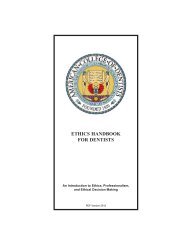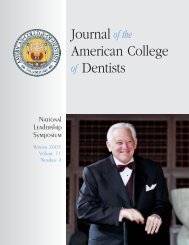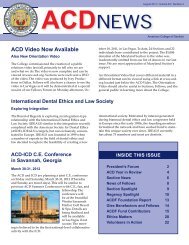Journal of the American College of Dentists
Journal of the American College of Dentists
Journal of the American College of Dentists
You also want an ePaper? Increase the reach of your titles
YUMPU automatically turns print PDFs into web optimized ePapers that Google loves.
2011 ACD Annual Meeting<br />
6<br />
I challenge you to<br />
step outside <strong>of</strong> your<br />
practices and represent<br />
our pr<strong>of</strong>ession in <strong>the</strong><br />
eyes <strong>of</strong> <strong>the</strong> public.<br />
To emphasize <strong>the</strong> significance <strong>of</strong><br />
our unprecedented challenges, I draw on<br />
history, as it is said that “past is prologue.”<br />
Looking back at <strong>the</strong> history <strong>of</strong> our country,<br />
I believe <strong>the</strong>re are certain parallels.<br />
One example, in 1803, President Thomas<br />
Jefferson knew that if <strong>the</strong> nascent democracy<br />
was to survive, America would<br />
have to take responsibility to control<br />
its destiny. He knew <strong>the</strong>re would be<br />
challenges to this effort from many<br />
outside influences and with ongoing<br />
threats to our self-proclaimed autonomy<br />
as a nation. Jefferson intuitively understood<br />
that America would have to<br />
continually fight for self-control and<br />
that that responsibility would fall to all<br />
<strong>American</strong>s. In short, <strong>American</strong>s would<br />
be stakeholders in <strong>the</strong> future <strong>of</strong> America<br />
and, likewise, <strong>American</strong>s would be <strong>the</strong><br />
beneficiaries <strong>of</strong> those efforts at stewardship<br />
<strong>of</strong> <strong>the</strong> fledgling nation.<br />
We can take lessons from Jefferson<br />
as our pr<strong>of</strong>ession, our practices, and<br />
healthcare delivery in general face new<br />
frontiers and an uncertain future. We<br />
must accept that our autonomy is not<br />
assured. We must accept that it is dentists<br />
who will and should have <strong>the</strong> greatest<br />
impact on <strong>the</strong> future <strong>of</strong> <strong>the</strong> pr<strong>of</strong>ession.<br />
And we dentists must assume our<br />
responsibility as stakeholders if dentistry<br />
is to be <strong>the</strong> pr<strong>of</strong>ession we would want<br />
for <strong>American</strong>s in <strong>the</strong> future. In short, we<br />
must accept, as noted by Alexander <strong>the</strong><br />
Great, that “upon <strong>the</strong> conduct <strong>of</strong> each<br />
lies <strong>the</strong> fate <strong>of</strong> all.”<br />
Now fast-forward to <strong>the</strong> twenty-first<br />
century. It has opened with all <strong>the</strong><br />
promise <strong>of</strong> a new beginning, with<br />
advances in technology and informatics<br />
that have <strong>the</strong> potential to change all that<br />
had gone before. Just as <strong>the</strong> demand for<br />
evidence-based outcomes has replaced<br />
<strong>the</strong> empiricism <strong>of</strong> <strong>the</strong> past, <strong>the</strong> pr<strong>of</strong>ession<br />
<strong>of</strong> dentistry continues to evolve. I was<br />
taught “extension for prevention” and<br />
now I subscribe to “restriction with<br />
conviction.” Clearly, <strong>the</strong>se changes have<br />
led us into <strong>the</strong> modern era <strong>of</strong> unforeseen<br />
advantages, and yet, an era in which<br />
we find ourselves with perhaps unanticipated<br />
and certainly unprecedented<br />
challenges. Among <strong>the</strong>se challenges I<br />
would note: (a) increasing disparities<br />
among <strong>the</strong> legitimate needs for patients;<br />
(b) available resources to meet those<br />
needs; (c) increasing dependence on<br />
market forces to transform healthcare<br />
systems; and (d) temptation for dentists<br />
to forsake <strong>the</strong>ir traditional commitment<br />
to <strong>the</strong> primacy <strong>of</strong> patient interests.<br />
Most dentists would agree that we<br />
must craft <strong>the</strong> future we seek for <strong>the</strong><br />
pr<strong>of</strong>ession. They would fur<strong>the</strong>r say that<br />
care should inherently be safe and<br />
patient-centered and that <strong>the</strong>re is no<br />
real health without oral health.<br />
But to be successful in our quest, as<br />
we promote <strong>the</strong>se basic premises on<br />
behalf <strong>of</strong> <strong>the</strong> pr<strong>of</strong>ession, we stakeholders<br />
must face and address precisely those<br />
questions that place us at a “tipping<br />
point.” I see those questions as including:<br />
1. How will oral health care be<br />
delivered in 2025 and beyond?<br />
2. Who will deliver it?<br />
2011 Volume 78, Number 4





